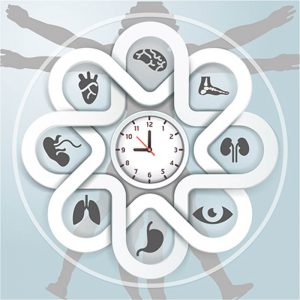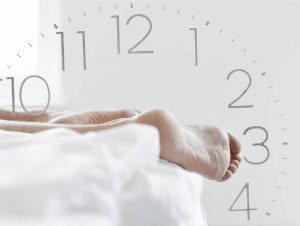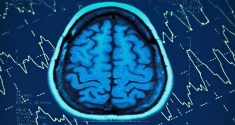Sleep should be a natural human activity, done without thought and without difficulty. However, many people have problems with their sleep patterns that affect their ability to function effectively during the day. Scientists are beginning to study these problems closely to determine ways to correct them and ensure that people benefit from each night’s rest.
What Is Chronobiology?
 Chronobiology is the study of physiological cycles and rhythms that occur in living organisms, including humans. The word comes from Greek, chronos, meaning “time,” bio, meaning “life” and ologia, meaning “the study of.” Many biological systems occur in patterns or rhythms, such as eating, sleeping, migrating, mating and other activities. These rhythms are often influenced by factors in the environment and operate much like a “clock” inside the brain to regulate important human functions. Scientists study these interactions to learn more about organisms and how to maintain their health.
Chronobiology is the study of physiological cycles and rhythms that occur in living organisms, including humans. The word comes from Greek, chronos, meaning “time,” bio, meaning “life” and ologia, meaning “the study of.” Many biological systems occur in patterns or rhythms, such as eating, sleeping, migrating, mating and other activities. These rhythms are often influenced by factors in the environment and operate much like a “clock” inside the brain to regulate important human functions. Scientists study these interactions to learn more about organisms and how to maintain their health.
The Chronobiology of Sleep
Like other creatures, human beings sleep to rest their bodies. However, in humans, the mind also uses this time to unwind from events experienced during the waking state. The alternate periods of light and darkness as the days pass helps to regulate our inner clocks to induce sleep patterns. However, certain factors can disrupt natural sleep/wake cycles. This disruption can have wide-ranging effects on mood, hormone levels, body temperature and mental acuity. A large number of people now live and work in environments that provide much different conditions than they would encounter in nature. They are exposed to artificial light for more hours in the day and may spend many more hours indoors during the winter months and may rarely be exposed to natural light during this season. This divergence from natural conditions can have a detrimental effect on sleep cycles.
Factors That Affect Sleep Quality

Regular Schedules: People who have regular work schedules and are able to divide their day into distinct periods of alertness and rest are more likely to enjoy healthy sleep patterns. Workers with changing shifts are at particular risk for long-term sleep disruptions.
Long Work Hours: During the winter, many people find they must leave home in the dark to go to work and come home in the dark at the end of the day. This lack of exposure to natural light can cause disturbances in the circadian rhythm that regulates sleep cycles.
Health Problems: Individuals who are experiencing medical problems may be at risk for sleep problems because of pain, effects of medications and lack of physical activity. These issues can cause changes in circadian rhythms that disrupt sleep.
Aging: Elderly individuals often have difficulty maintaining healthy sleep patterns because of lack or activity, medical issues, medications or metabolic changes due to age. Lack of quality sleep can cause fatigue and napping during the day, further reinforcing the disrupted cycles.
Sleep Problems Damage Health

Research on Circadian Rhythms
Scientists have learned that disruptions in the circadian rhythm have a significant effect on sleep cycles. Just as animals take cues from the environment around them to help them to survive, human beings have also evolved to react to environmental cues. When the normal cues for physical functions are absent or even shifted slightly, it can result in significant reactions in the body. Patterns of darkness and light, sound levels and other factors can make normal sleep cycles impossible and can prevent the restorative action of sleep to relieve stress, lower blood pressure and allow the mental review of life events through REM sleep periods. These are critical activities that allow human beings to continue to engage in the broad range of physical and mental activities required during their waking hours.
Chronobiology Offers Help for Insomnia and Poor Sleep
Research in chronobiology and sleep disturbances finds that manipulating the amount of light that an individual is exposed to can help to reset the inner clock and induce more natural sleeping patterns. Just as increasing the exposure to light can help to relieve seasonal affective disorder, light therapy can be used to fool the body into believing it has experienced a normal amount of daytime light, allowing it to become drowsy in the evening hours and producing better sleep throughout the night hours.







